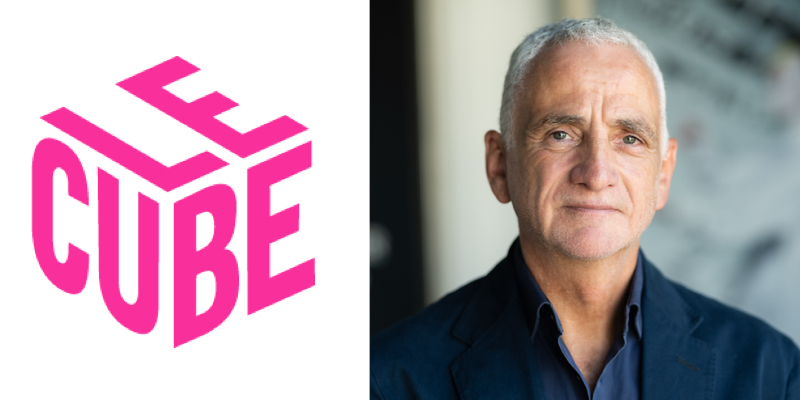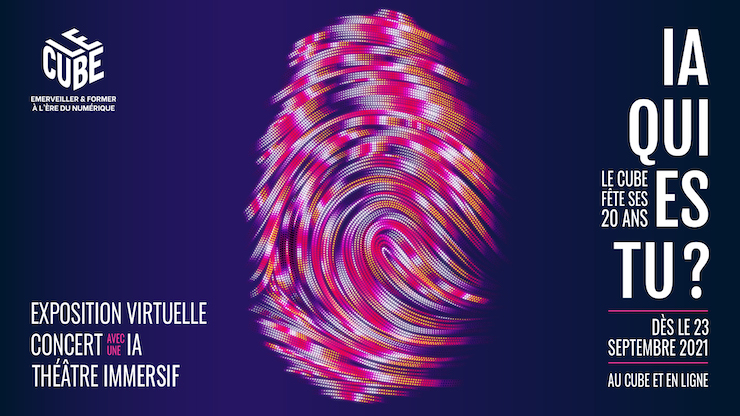Twenty years ago, Le Cube was born, an association dedicated to digital creativity and training. Since its beginnings, it has skillfully combined digital creativity, training in new practices, education, as well as reflection on societal issues, at the service of the public and businesses. Preparedness, creativity and innovation yes, but also collectively commensurate with the potential of digital. Because the essence of Cube is to participate and actively participate in creating an innovative environment to better adapt to the world to come. Twenty years later, Le Cube celebrates its anniversary with a guest of honor: artificial intelligence. Cube President Nils Azyusmanov was kind enough to answer our questions.
1- The Cube celebrates its twentieth anniversary: Can you tell us about the reason for its existence and its highlights?
Cube’s number one reason is to support artists who take risks by exploring new ways to be creative. New technologies are renewing patterns of creativity and this paradigm shift invites us to “create new ways of creating”, to imagine new ways of imagining. These new forms invite us to new experiences, open our imaginations, heighten our senses and amplify our relationship with the world.
“More than 4,000 artists from the international scene have been recognized at Cube and more than 400 productions have been supported, some of which have toured the world.”
The second reason for the existence of Cube lies in our approach to educational innovation, for example, when we implement projects each year to connect more than 150 children with authors, artists, designers, programmers or even anthropologists, around innovative creativity. . Ces programs interdisciplinaires et inter générationnels explorent d’autres façons de « faire et être ensemble », ils ont permis la réalisation de projets extraordinaires, comme par exemple la participation à la conception de la « fabrique à hist unquiires grandis » several years.
Finally, the third reason Cube exists is to host public debates such as Le Rendez-vous des Futurs, over 160 online programs that invite personalities from all walks of life to express their vision on major contemporary issues. Today’s media allows us to see all the realities of the world, it is no longer a question of representing them but of confronting them. That is why we need to devise spaces for mediation, dialogue, listening and other, far from the landscape of the mainstream media and the conspiratorial clamor of social networks. We were able to experience intense moments like during the show’s reception of economist Jeremy Rifkin, one of the biggest agitators of digital transformation and the Green New Deal.
2- You chose to celebrate this anniversary with a special program on artificial intelligence, why?
Although it is invisible, AI is ubiquitous in our lives, it is located in our smartphones, our cars, or the things we use in our daily lives. It transforms most jobs by doing certain tasks better than us. To function, it uses vast deposits of data that it analyzes and correlates, thus amplifying the distortion of reality and helping us in a personal way in many areas. But these exploits raise many ethical questions, such as the dangers of alienation associated with addiction, disinformation, or cognitive manipulation.
On a more philosophical level, the question is “What is the fate of our humanity in the face of computational intelligence”? What is left of our creativity when our new “cognitive externalities” are able to make decisions on their own, and help us with everything? What meaning should be given to the existential GPS? This anthropological discontinuity invites us to rethink our relationship to ourselves, to others and, more broadly, to the world.
“Artificial intelligence is a great tool, but it can lead to a two-speed society, with ‘augmented humans’ on the one hand, which underpins the dream of transhumanism, and on the other hand, the internet, the knowledge economy is left out.”
So we must involve all citizens in this transformation process, the vitality and future of democracy is at stake. Otherwise we would be amplifying exceptions, such as elecosis, which affects roughly one in five people, creating a bed of extremism. This is why we chose AI as the common thread in programming the 20th anniversary of Cube. This “guest of honor” gives meaning to the party: By personalizing artificial intelligence, digital arts open us up to the challenges of the 21st century.
3- What is your conviction about artificial intelligence?
The question for me is not whether it should exist or not, but how to put it at the service of the common good. The black box should not be in the hands of a few elites, but placed at the service of education, solidarity, environment, creativity…, all topics that need to be deeply rethought in a more complex and challenging world.
“Artificial intelligence is what we make of it, it’s a citizen, political and moral choice.”
4- How are children awakened to artificial intelligence from an early age? And how does Le Cube work around that?
Children need to understand that they will share their lives with “artificial creatures” in all areas. Whether it’s in the form of a conversational agent in an app, a virtual character in a video game, an industrial robot or a “smart coffee maker,” we increasingly live in connected, relational, and even emotional environments. So we must learn to distinguish between the real and the artificial, the human from the code, and the empathic from the allocation algorithm.
Le Cube creates critical awareness training around these questions. This is to demystify technology, for example by understanding how a computer program works, and to stimulate creative research by exploiting the potential of digital technology.
5/ What has been the latest advancement in artificial intelligence that has surprised you?
The most exciting for me is the global rise of artificial intelligence in all areas! Its use in science and innovation is making astounding leaps in energy, food production, mobility, health, security, information, creative industries, etc., and nothing escapes this tsunami. New professions are emerging, such as data science, neuroscience, cognitive design, or e-sports. China and the United States are leading the way in topics such as quantum computing, autonomous weapons, or biotechnologies.
These astonishing developments raise the question of what are we going to do with them collectively, for what purpose, and for what leap of consciousness? Because the real challenges lie in maintaining biodiversity, health, equality and inclusion. AI must help us solve technical problems, but also allow us to advance at the human level, otherwise there will be no real progress, we will only accelerate disaster.

“Certified tv guru. Reader. Professional writer. Avid introvert. Extreme pop culture buff.”








More Stories
Samsung Quantum Dot TV: Art meets technology
Pitch: €56m for energy startup Reverion
Plastoplan: Plastics for Energy Transition